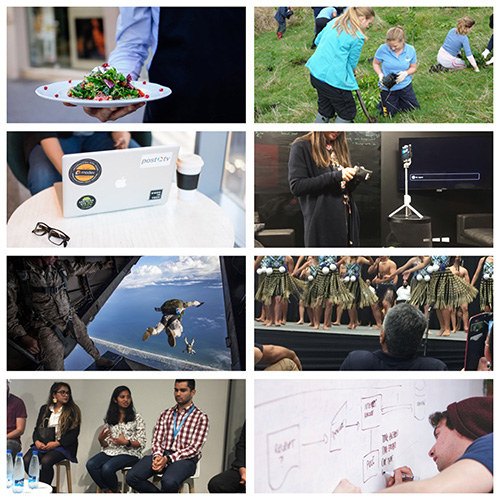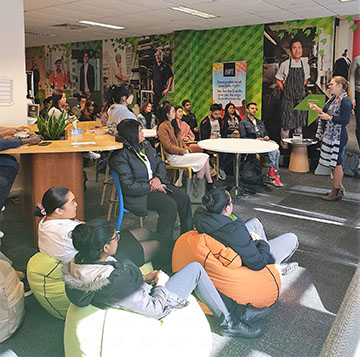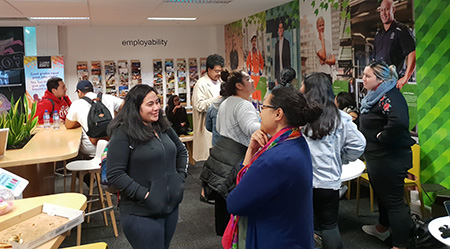
So you don't think you've got anything to offer employers aside from your qualification? You’d be surprised how many skills you’re developing, alongside your technical professional skills, as you study, work and play. Get some pointers from four employers who recently presented at AUT Employability Matters!
An important part of preparing for employment is to think about the skills you have developed from all aspects of life and see how they transfer into roles you’re wanting to apply for.
Take a step back and look at that skills you have, suggests Seek NZ Customer Success Manager Gemma Richardson.
“So you think you don’t have any experience? Well you do!” she says. “Ask yourself what transferable skills do you have from all aspects of your life that could get you through the door into a starting role? This includes skills learned during study, project work and volunteering - all great ways to develop and demonstrate transferable skills.”
Retail, hospitality and volunteering are gold
MYOB NZ education manager Shailan Patel says many students under estimate the skills they’re developing through part time jobs and volunteering.
“Retail, hospitality and volunteering skills are extremely transferable – they are gold - especially if you’ve been dealing with people with problems that need solving,” he says. “Think about what you want to do, where you can transfer your skills and where the opportunities are, then seek them out.”
Shailan got his current role because he was good at building relationships, which is what MYOB wanted. He had never dealt with students yet is a large part of the role.
This doesn’t mean that technical skills are not important, adds Shailan, but employers are keen to find people who align with the organisation’s culture and values and can add to it.
 Applicants that make an impact when applying for the EY graduate programme are the ones that have sat down and taken time to really think about who they are, declares EY campus recruitment senior consultant Hannah Booth. “We do look at grades but we also want to know about the other things you’re participating in. Don’t discount anything you do as irrelevant.”
Applicants that make an impact when applying for the EY graduate programme are the ones that have sat down and taken time to really think about who they are, declares EY campus recruitment senior consultant Hannah Booth. “We do look at grades but we also want to know about the other things you’re participating in. Don’t discount anything you do as irrelevant.”
She strongly advises you give as much credence to your part time work in your CV as you do to study or clubs. “Working at Countdown, for example, shows you are dedicated, you show up to your job and know how to work in a workplace. It may not be relevant to what you’re going to do in the future, but it is relevant to your application because it demonstrates valuable skills to us.”
What have you learned through experiences?
Show us you can make lemonade out of lemons, says Auckland Council graduate programmes leader Lacey Knight.
“Talk about how you turned a difficult situation around. Over lockdown some students spoke of setting up phone trees to connect with people around them. That sense of community makes someone stand out to us at Council. I also like to hear candidates talk about the volunteering they’ve done.”
AUT employability relationship manager Alex Booth says describing your skills on your CV or in an interview is about story telling.
“What did you learn and what was the experience like? At Countdown, you were working with people from various backgrounds and learning how to etc... Or did you see processes that were really frustrating and could say you learned patience but also could see what could be changed? Tell the story of your skills.”
She emphasises that every experience is a learning opportunity and it is those experiences that need to become your individual story.
Gemma recommends making the most of opportunities to upskill while you’re studying, building on your transferable skills and finding new experiences, including in voluntary roles. "To upskill is to prepare for the future, you need to understand how your industry is changing and what skills are in demand."
She also advises you should be careful not to pigeonhole yourself too early in your career.
"You might need to go side wise to get more experience or take on short term contract roles but it all builds up experience. Be resilient and open to adapt.”
You also need to build up skills you feel you’re lacking, suggests Hannah. “If you don’t think you’ve got good teamwork skills or public speaking skills, find a way to improve those skills.”
Shailan encourages students to look online to find free webinars of interest.
“You can join webinars in Australia, US and Europe. There is more opportunity to get involved in some of these networks and groups at the moment because you’re not limited to attending in person."
Help right under your nose
There are plenty of courses and workshops running on campus to help you build your transferable skills, such as joining  Toast Masters to improve your public speaking, joining clubs, or signing up for the AUT Edge Award or Beyond AUT Award.
Toast Masters to improve your public speaking, joining clubs, or signing up for the AUT Edge Award or Beyond AUT Award.
The awards require you to do volunteering (often in group settings) which is a great way to build up your confidence in a more supported environment.
Don't forget to research!
“Research the industry or industries you’re wanting to enter and ask yourself - what business do I want to work for? How do I get in there? Where are the opportunities?” suggests Gemma.
She recommended students look at the Government’s 2020 Budget to see where government investment is investing - and keep an eye on the market by looking for industries with potential job growth - over the next year.
“Do your research, leverage your skills and think about what’s on offer, short and long term,” Gemma advised.
Budget priorities included the health sector, social sector, education, primary industries, justice, arts and culture, justice, defence and foreign affairs and transport," says Gemma Richardson from SEEK NZ .
Useful sites to research include -
- SEEK’s online resources, including their Career Advice section.
- AUT’s Elabonline and My CareerLab
- Trade Me
- Industry associations websites, LinkedIn pages
- Read our other blog on transferable employability skills
PS: Job Growth in May
While job advertisements are slow to come through right now, our presenters said they were seeing a demand in advisory practice, project management and project coordination, customer service and sales support.
Want some help?
AUT Employability and Careers runs workshops throughout the week on networking, personal brands, LinkedIn profiles, job search etc for AUT students. There are also regular presentations from employers.
Sign up to elabonline to book a workshop or employer session. Not been on Elabonline before? It's easy. Simply click on the link, put in your student password and ID and you're there.
Written by AUT Employability and Careers writer Angela McCarthy





